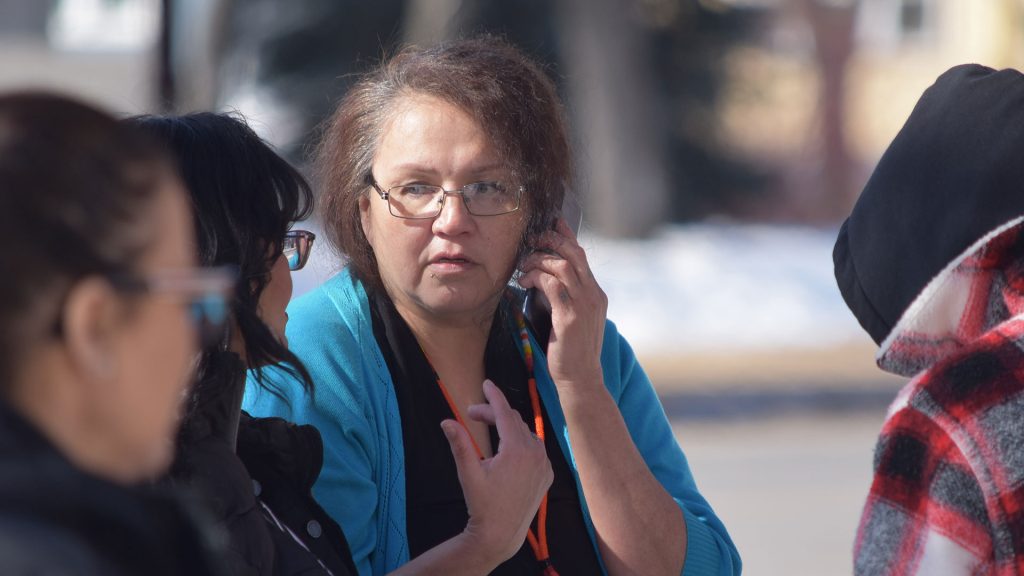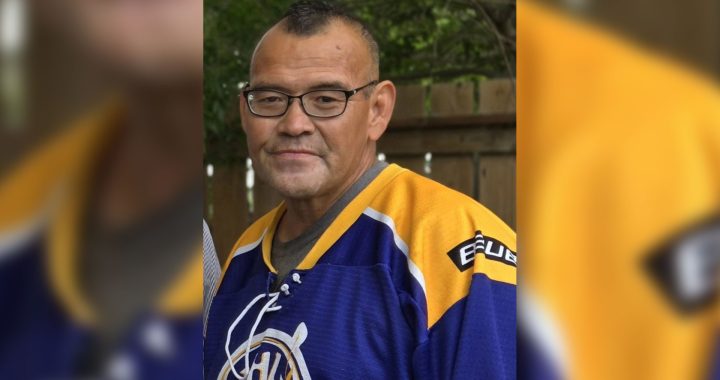
Nerissa Quewezance outside the Yorkton, Sask., courthouse in 2023. Photo: APTN file
A Saulteaux woman hoping to be found wrongfully convicted has been arrested for allegedly breaching her bail conditions.
Nerissa Quewezance was arrested April 13 after police picked her up on two release order warrants, said Easton Hamm, a spokesperson for the Saskatoon Police Service.
Quewezance, 49, was charged with failing to comply and remains in custody.
She and her sister, Odelia, made headlines in March 2023 when they were freed on bail to await the outcome of a federal Justice Department review of their 1994 second-degree murder convictions.
The sisters from Keeseekoose First Nation in southeastern Saskatchewan say they spent 30 years in prison for a crime they didn’t commit. Their cousin, who was a youth at the time, confessed to killing farmer Anthony Dolff, 70, in 1993.
Read More:
Saskatchewan judge releases Saulteaux sisters on bail while minister reviews murder case
The federal review began in 2022.
Their lawyer, James Lockyer of Toronto, said Wednesday he notified both the judge, who granted the bail, and the Crown prosecutor on the case about Nerissa’s arrest.
“I am hoping the Saskatchewan prosecutors will show understanding of her situation and not want to pursue the charges of breaching her bail,” Lockyer said in a telephone interview.
“She lasted for a year (on bail). That’s pretty good going.”
Lockyer said he was in the process of crafting a new bail application for Nerissa.
Comment
Saskatchewan Justice said “Public Prosecutions will not be providing any further comment at this time” because the matter is before the courts.
Lockyer said both women have been struggling with the bail conditions as they await the outcome of the lengthy review.
“We’re hoping to get rid of these convictions entirely – as soon as we can – and once we’ve done that they’re no longer under any kind of court order,” he added.
“It’s an awful waiting game.”
One of the sisters’ staunchest advocates recently asked federal Justice Minister Arif Virani to wrap up the review.
“Both sisters’ current freedoms are extremely limited, and they continue to have a black cloud over them as the wheels of the federal justice system turn at a snail’s pace,” said Kim Beaudin, national vice-chief for the Congress of Aboriginal Peoples, in an April 12 letter to Virani obtained by APTN.
Read More:
There may have been a miscarriage of justice in case of Quewezance sisters, says justice minister
“You have the power to expedite this process, to set an example to all other cases seeking redress for wrongful convictions. It is critical that this government moves this case forward with all due haste, to prove its seriousness about ‘David and Joyce Milgaard’s Law’ (Bill C-40).”
David and Joyce Milgaard’s Law, named for a Winnipeg mother who worked alone to exonerate her son of rape and murder convictions, would establish a Miscarriage of Justice Review Commission to investigate miscarriage of justice applications in a timelier fashion.
David Milgaard, who died in 2022 after a short illness, wanted a faster and easier system for innocent people.
Right now, the reviews take between two and five years, noted Lockyer.
“As you know, there is currently a criminal conviction review process that is handled by the Criminal Conviction Review Group (CCRG) within the Justice department. Individuals who have exhausted their rights of appeal can apply to have their convictions reviewed,” said Chantalle Aubertin, spokesperson for Virani.
“When an application is made, the CCRG conducts a review on the Minister’s behalf and advises him on the appropriate remedy, if any. The Minister of Justice will then review relevant material and decide, on the basis of the facts and the law, whether a review application should be dismissed or allowed. The Minister of Justice cannot comment on ongoing criminal conviction reviews.”
Aubertin noted “the (Opposition) Conservatives played politics at committee stage on Bill C-40” delaying its approval.
Editor’s Note: The story was updated 18/04/24 with comment from Saskatchewan Justice










